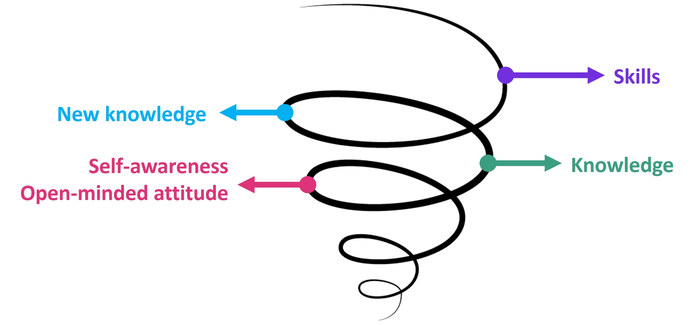Conceptualising intercultural competence, it was argued that it has a knowledge, skills and awareness as well as attitude dimension. Following these distinctions, competencies related to openness would be strongly linked to the awareness and attitude dimension, whereas communication has a stronger skills orientation and culture-reflexive knowledge a knowledge orientation.
Although making these distinctions help us to capture the concept of intercultural competence, we need to be aware that the dimensions are interlinked and even build on each other. Knowing alone does not activate an appropriate response or change people's behaviour nor does it change their emotional engagement in a certain situation. Knowledge needs to be complemented with an awareness of where and how culture influences interactions as well as an awareness of our own common practices. And it needs to come along with an open and conducive attitude and thus readiness, desire to and empathy for understanding other people. Whereas our knowledge helps us to analyse a given situation and provides possible explanations, it is our attitude which motivates us to engage. And such an engagement requires skills helping us to do so and to manoeuvre a given situation well, investigate, discuss and negotiate a common ground of understanding. It also requires skills to manage our experiences of strangeness, in other words our feeling of uncertainty and thus our emotions.
What this discussion highlights is how closely interlinked the different dimensions are and that in fact, they also reinforce each other. The knowledge about culture in general as well as its influence on behaviour you acquired joining this course was meant to enhance your repertoire of relevant knowledge for intercultural encounters. And by increasing your knowledge it is expected that you also increased your awareness, cultural sensitivity and open-mindedness. With the knowledge at hand, an awareness and your communication skills, the aim of this module was thus to enhance your ability to negotiate culture together. This in turn has the potential to lead to more knowledge, a greater awareness and an enhancement of your communication skills. This is what the image with the spiral indicates.

Figure: Development of intercultural competence
Diagram developed by Thu Phong Vuong for this course
Applying your intercultural competencies can in one instance, simply help you to better understand what is going on in a given encounter. In another instance it may support paving the way for a positive interaction and the development of a common ground of understanding. And yet in another instance intercultural competence can be put to use for the creation of normality and plausibility as well as routine actions. The more we know, the more experienced we are, the better are we able to understand and manage critical encounters in general and complex encounters in particular. Constantly seeking to expand our knowledge not only supports avoiding misunderstandings and misperceptions but also dealing with irritations and complex issues. This means that we persistently need to enhance our knowledge, be ready to question, reflect and explore with an open mind. Developing intercultural competence is thus best understood as an ongoing process and therefore often referred to as a lifetime learning opportunity. If we are ready to continue traveling it is a fascinating and personal enriching journey for all of us.